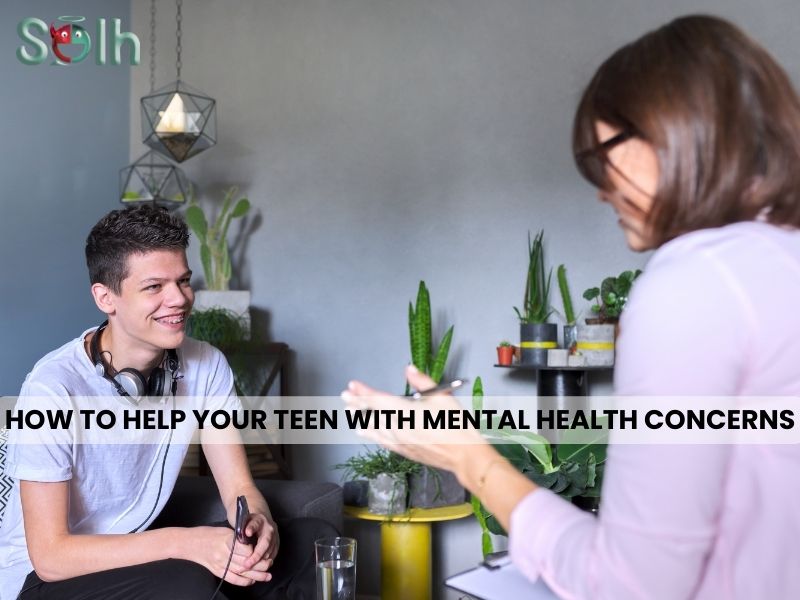Adolescence, a period marked by rapid physical, emotional, and social change, can be a turbulent time for teenagers. The pressures to fit in, excel academically, navigate social media landscapes, and chart a course for the future can all contribute to a heightened vulnerability to mental health challenges.
Statistics reveal a concerning rise in these issues among teens, making it more crucial than ever to have a comprehensive understanding of the factors influencing their mental well-being. This guide addresses this critical need by serving as a one-stop resource for parents, educators, caregivers, and anyone who interacts with teenagers.
It goes beyond simply recognizing the warning signs of anxiety, depression, or other mental health concerns. Instead, it delves into the complexities that shape adolescent mental health, offering expert-backed advice and practical strategies for fostering a supportive environment.
From fostering open communication and creating safe spaces to implementing effective self-care practices , this guide equips you with the tools to navigate these challenges alongside the teens in your life.
Whether you're a parent seeking to understand your teenager's emotional shifts, an educator witnessing mental health struggles in the classroom, or a friend concerned about a peer, this comprehensive resource empowers you to become a pillar of support for the mental well-being of the teenagers you care about.
This journey starts with understanding the landscape of teen mental health , the challenges they face, and the proactive steps we can all take to promote positive mental well-being for this next generation.
Signs of mental health issues in teen
Identifying the signs of mental health issues in teens is crucial for early intervention and support. Look out for changes in behaviour, mood swings, withdrawal from activities, changes in sleep patterns, and a decline in academic performance. Additionally, pay attention to signs of substance abuse, self-harm, and expressions of hopelessness.
It is important to approach these signs with sensitivity and empathy, creating a safe space for open communication and seeking professional help when needed. By recognizing these signs early on, you can better support the mental well-being of teenagers and provide them with the necessary resources and assistance to navigate through their challenges.
Expert tips and strategies for supporting teen mental health
Having identified potential mental health signs in your teen, the next crucial step is providing effective support. While seeking professional guidance from therapists or school counselors remains paramount for personalized strategies, there's a wealth you can do at home. Imagine building a bridge towards their well-being. Here's how to lay the foundation:
Open the Gates of Communication: Foster a safe space where your teen feels comfortable expressing their emotions and concerns. This means active listening without judgement. Put down your phone, make eye contact, and truly hear them out. Validate their feelings, even if you don't understand them entirely. Phrases like "It sounds like you're feeling overwhelmed" or "That situation must be really frustrating" can go a long way.
Set Clear Boundaries, Build Trust: Boundaries aren't walls; they're guideposts. Establish clear expectations for behavior while offering unwavering support. This creates a sense of security and accountability. Teens crave consistency, so try to maintain routines as much as possible, especially around sleep schedules and screen time.
Fuel Their Body and Mind: Just like a car needs the right fuel, a teen's brain thrives on balanced nutrition and regular sleep. Encourage healthy meals packed with fruits, vegetables, and whole grains. Ensure they prioritise sufficient sleep for optimal brain function and emotional regulation.
The Power of Self-Care: Empower your teen to prioritise self-care practices. Encourage regular exercise, whether it's joining a team sport, hitting the gym, or simply taking walks outdoors. Exercise is a natural mood booster! Introduce relaxation techniques like deep breathing or meditation to help them manage stress and find inner peace. Don't forget the importance of fun! Encourage hobbies, spending quality time with friends, or creative outlets that bring them joy.
Creating a safe and supportive environment
Establishing a safe and supportive environment is crucial for promoting teen mental health. Encourage open communication by creating a space where teens feel heard and understood. Set clear boundaries and provide consistent support to help them navigate challenges. Foster a sense of belonging and acceptance by promoting inclusivity and celebrating their individuality.
Ensure access to resources like support groups or hotlines for additional help when needed. By creating a nurturing environment, you can empower teens to prioritise their mental health and seek assistance when facing difficulties. Stay tuned for more tips on cultivating a positive and supportive atmosphere for teens' mental well-being.
Encouraging open communication and seeking professional help
Encouraging open communication with teens about their thoughts and feelings is vital in supporting their mental health. Actively listen without judgement, validate their emotions, and offer support in navigating challenges.
Educate them on the importance of seeking professional help when needed, such as therapy or counseling. Normalise the idea that asking for help is a sign of strength and courage. Encourage teens to confide in a trusted adult or mental health professional if they are experiencing persistent distress or mental health issues.
Remember, seeking help is a proactive step towards healing and well-being. Stay tuned for expert advice on effective communication strategies and seeking appropriate mental health support for teens.
Implementing self-care practices for teens
Self-care plays a crucial role in maintaining good mental health for teens. Encourage them to develop healthy habits such as prioritising sufficient sleep, nutritious meals, physical activity, and relaxation techniques.
Teach them the importance of setting boundaries, managing stress, and practising mindfulness exercises. Engage in activities they enjoy, whether it's hobbies, spending time with friends, or creative outlets.
By fostering a balance between responsibilities and self-care, teens can better cope with daily stressors and enhance their overall well-being. Stay tuned for expert tips on tailored self-care practices to support teen mental health effectively.
Resources and further support for teen mental health
In addition to implementing self-care practices, it is important to leverage available resources and professional support for teen mental health. Consider seeking guidance from school counselors, therapists, or mental health professionals for personalised strategies to address specific concerns.
Online platforms such as trusted mental health websites, hotlines, and support groups can also provide valuable information and guidance. Encourage open communication with teens about their mental health and be ready to explore treatment options if needed.
Stay informed about local mental health resources and organizations to ensure teens have access to the support they need. Remember, seeking help is a sign of strength and resilience.
Remember, supporting your teen's mental health is a marathon, not a sprint. Celebrate their victories, big and small, and offer unwavering support through challenges. By fostering open communication, creating a safe space, and encouraging healthy habits, you can empower them to navigate this crucial stage.
Don't hesitate to seek professional help when needed, as it's a sign of strength and a proactive step towards a brighter future for your teen. Together, you can build a foundation for lifelong mental well-being.
Supporting your teen's mental health can feel overwhelming, and it's okay to admit it. Solh can be your partner on this journey. We understand the challenges you face, the worry, and the constant need to be there for your teen.
Solh offers a safe space for you too. Here, you'll find resources to manage your own well-being, because a healthy you can better support your teen. Explore journaling prompts for self-reflection, or connect with a counselor instantly through our "Talk Now" feature.
You're not alone. Share your experiences and find comfort in our anonymous support groups. Solh Buddy, your virtual companion, offers personalized encouragement along the way.Take charge of your own well-being so you can better support your teen's. Explore Solh and find the spark that will help you guide your teen through this together.



